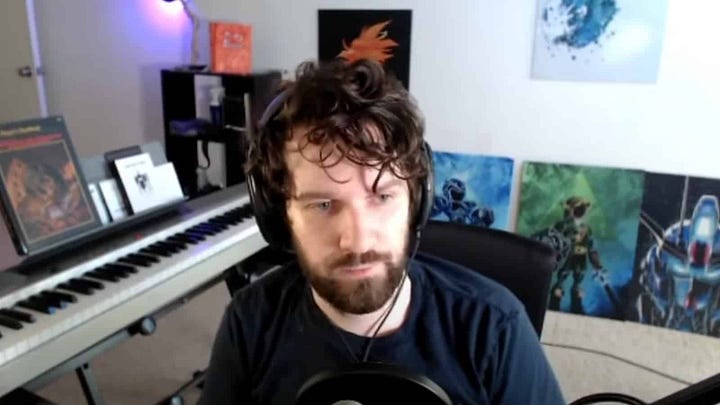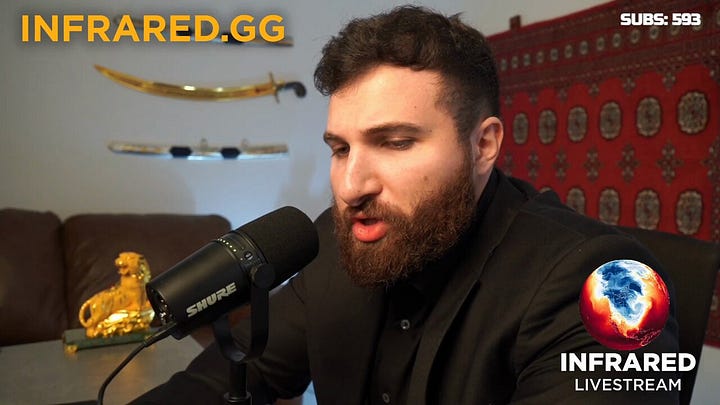Many theories for understanding the dynamics of social media tend to revolve around two concepts, whether knowingly or otherwise. The first is René Girard’s concept of ‘Mimetic Desire’ from his 1961 literary study Desire, Deceit and the Novel. The second is the more amorphous concept of Parasocial Interaction, the genealogy of which I believe comes from social psychology and was specifically adapted to the internet almost from its inception onwards.
Though covering much ground when applied generously, both theories don’t sufficiently describe certain nuances of the contemporary moment. Both to some extent take the object of mimetic or parasocial desire as an aspirational figure, which isn’t by any means universally applicable. This is readily apparent when one examines the most popular figures in the ‘live streaming’ politics and debate world, which are also some of the most popular figures on the internet itself (and thus the world), with audiences and engagement that dwarves that of most politicians, journalists, or public intellectuals.
I was recently introduced to a few of these different streamers. One of them, called Destiny (a ‘liberal’'), was debating Norman Finklestein on Israel and Gaza, and another named Haz Al-Din (a Marxist) was talking with Alexander Dugin. (I’ve also come across others before in small doses - Hasan Piker, Vaush V, et al.) Both discussions were interesting insomuch as they were uncanny, absurdist spectacles. I believe that both of them, like others, gained their vast following by starting as video game streamers before branching out into political debates.
Though putatively belonging to two different ideological persuasions, I was struck by the many similarities in their affect - their lexicon, their mannerisms, speech, and, dare I say physiognomy. As their origins should suggest, they’re united by a certain spiritual adolescence, and they are by no means alone in this. I’ve stumbled across many of these ‘Internet Guy’ archetypes over the past few years, and have been struck by a certain consistency. By and large, they are not people whom large numbers of their audience only aspire to be, rather than people who they already are.
But are these strictly objects of mimetic or parasocial desire then, if they are less aspirational and more consolational? The distinction is not without significance. They speak not to a state of being which one would like to attain, of self-improvement, but rather an admission of defeat, of consolation and solace at who one is. Yet they do live lives of material comfort that their audiences covet, nonetheless - despite being exactly the same as them. Robert Pfaller’s theory of ‘interpassivity’ (‘delegated enjoyment’ and vicarious experience) has much to inform us in this respect, but again, it doesn’t really come close to explaining everything. It’s clear that the followers of these ‘Internet Guys’ love them and hate them in equal measure, as they love and hate themselves. This is somewhat at odds with the notion of ‘relatability’ which drives the para-social interaction. Aspiration is a hope for the future, consolation is something else entirely, and something which speaks to the uniquely dystopian character of present-day technological anomie.
The popular resurgence of interest in the theory of archetypes, Jungian or otherwise, is driven by convenience and necessity in the internet era, where classification and taxonomy are essential. But less has been said of the relation between the archetype and the aesthetic, in its present internet usage - as both noun and adjective, what I have described variously as The ‘Ideological Aesthetic.’
An ‘aesthetic’, after all, much like an ‘archetype’, is not an image (or not only)…but something which only becomes apparent in images.
(Important to stress how much I’m just banging this out in 20 minutes. Maybe I will develop further...but I like the idea of this as a clearing house for all of the half-formed ideas I've convinced myself I will somehow elaborate on eventually, but will never have time to get around to - which is undoubtedly a good thing.)








It looks interesting; and consistently. I have always wanted to discuss with someone the nature of the so-called social media. Namely, I am convinced that the phrase 'social media' is not complete and does not express something important. Instead of 'social media', we have to talk about 'virtual social media'.
Masterpiece. Bravo.